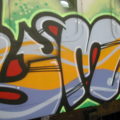Italian, like English and many others, accretes words from other languages. Often these are modern terms which have no easy equivalent in antique Latin or Greek roots.
For example: Ten years ago, Italians didn’t know how to refer to the process of scanning (a page, a photograph) using a scanner.
The correct word – digitalizzare (“digitalize”) – is unwieldy. An Italian speaker might instinctively invent a verb based on the foreign noun. But scannare already has a meaning in Italian: to slaughter! Which seems rather overkill for some poor, innocent document.
The compromise has been to use scannerizzare – “to scannerize”. Or else to say scannare with a wink, to acknowledge that the speaker knows that the usage is not correct.
clubs
There are lots of perfectly good words that one could use in Italian (associazione, circolo) for a group of people who gather to share a common interest, but for some reason the English “club” is also used.
However, for reasons which completely elude me, a short English u often ends up pronounced as eh by Italian speakers. Furthermore, English plurals are often abused by Italian speakers, being added or removed (with or without a superfluous apostrophe) without any consideration for real English usage. Hence the satirical music group Squallor could produce a song entitled Ti ho conosciuto in un clubs, where the final word is singular and is pronounced “clebs”.
stress
There is no good Italian equivalent for the modern use of “stress” in English. You could say sotto tensione to mean “under stress,” but stress is so commonly used that most people would now say sotto stress or stressato/a (stressed) and stressare (to make stressed, to cause stress).
handicap, handicappato
Usually pronounced without the initial h (there is no h in Italian) and, apparently, there is no native word for handicapped.





2 thoughts on “Itlish: English Words in “Common” Use in Italian”